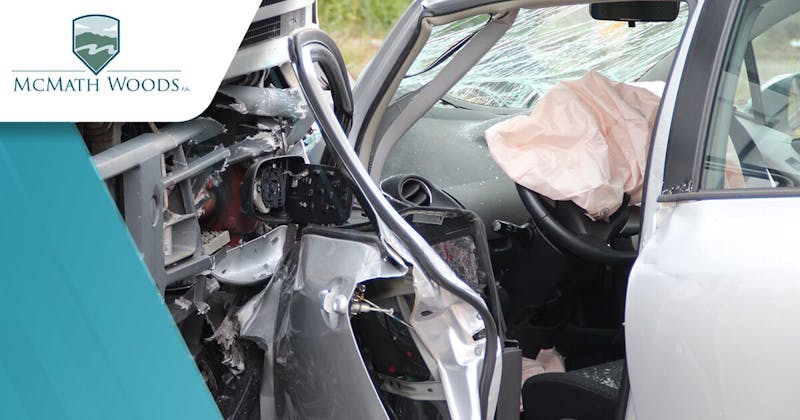
When someone has been involved in a car accident, it’s natural to panic.
An at-fault driver might feel that if they stretch the truth about their involvement, it could mean serious condolences for themselves. Sometimes, when the at-fault driver is questioned about their role in the accident, they may lie or try to downplay the situation. However, these false claims can cause a variety of problems for those affected by their actions.
Fortunately, with the right evidence and legal team on your side, you can counteract these blatant falsehoods.
At McMath Woods P.A., we know that it can be frustrating to proceed with an accident claim or personal injury lawsuit. And when the other parties lie about their involvement, it can lead to even more hassles.
In this blog, we’ll look at the common lies told by at-fault parties and what you can do to strengthen your claim.
Common Lies by At-Fault Drivers
No one wants to get into trouble. For that reason, when someone’s actions lead to an accident, they may try to lie about the situation. They may be afraid of potential legal action, increased insurance rates, or just having to pay for repairs or injuries.
At-fault drivers may resort to a variety of dishonest tactics in an attempt to avoid taking responsibility for their actions. Some of these may include:
- Often, these drivers will try to deny any negligence or reckless behavior. Even if it is clear that they were driving dangerously or carelessly, they may shift responsibility.
- Another tactic is to falsely claim that their vehicle suffered from mechanical failure. In turn, they are shifting the blame from themselves to their vehicle in hopes it absolves them of any responsibility.
- At-fault drivers may try to distort the sequence of events leading up to the accident. Sometimes, this is an effort to make it seem like the other driver was at fault.
- Some drivers may blame external factors, such as the weather, road conditions, or even the victim themselves, to avoid taking responsibility for their actions.
In these cases, you need an Arkansas car accident lawyer to assist with your claim. While you focus on your recovery, they can help build a strong case with corroborating evidence.
Steps to Protect Your Claim
If you have been in an accident, you will want to take steps to protect your case. Evidence will be your strong ally when an at-fault driver lies about their involvement in the crash.
First, you will want to have the incident documented by law enforcement. Whether you have the police on the scene or file at a later date, make sure that there is a police report of the accident. Once you have your side of the story noted, you can proceed with the other steps of the claim.
When talking to law enforcement, filing an insurance claim, or discussing the accident with an adjuster, keep your statements consistent and factual. You’ll want to stick to the facts and not embellish or exaggerate what happened. If the other driver is lying, there is a chance that they will make contradictory statements about the incident. In turn, you can use that as evidence in your case.
If the scene is safe, you may speak to potential witnesses at the accident scene.
Sometimes, it is better to have third-party accounts of the incident. With that, you can gather their accounts to support your version of events. Witnesses can be valuable in backing up your claim, and their statements can help corroborate your story.
After that, you may need to collect other evidence. Phone records, expert analysis, or surveillance footage can help prove the other driver’s dishonesty. When you work with an experienced lawyer, they can present this evidence in a way that helps strengthen your case and increase your chances of receiving a fair settlement.
By taking these steps, you can protect your claim and ensure that you receive the compensation you deserve.
Any Legal Consequences for the Lying Driver?
At-fault drivers who lie about the incident could face legal consequences. This could fall under the category of insurance fraud, which leads to losses totaling $308.6 billion per year, according to the Coalition Against Insurance Fraud.
However, the prosecutors would have to show that the driver intentionally intended to deceive insurance adjusters to make a false claim. Sometimes, denying responsibility is not enough to lead to a criminal offense.
However, making false statements to an insurance company could result in coverage cancellation.
If an insurance company discovers that a person has intentionally provided false information to affect their coverage for a collision, they may revoke the coverage. Also, if a person is an accident victim and the at-fault driver lies, it can impact their claim. Discrepancies in statements can lead to the denial of insurance claims or reduced compensation.
Honesty is always the best policy when it comes to discussing the facts of a car accident.
Unfortunately, not everyone plays fair when it comes to settling insurance claims. Some at-fault drivers are deceptive in order to shift blame from their actions. Dealing with these individuals and the potential effects they can have on your claim is distressing.
At McMath Woods P.A., we know the frustration of proceeding through every step of a personal injury or insurance claim.
For that reason, we always offer a free initial consultation to help you better understand your rights so you can take the next steps to build a truthful and solid accident claim.

